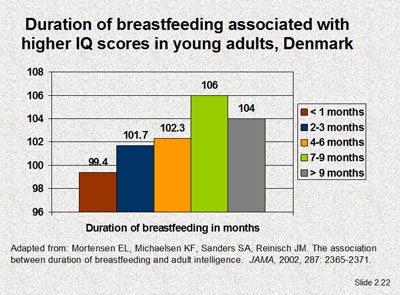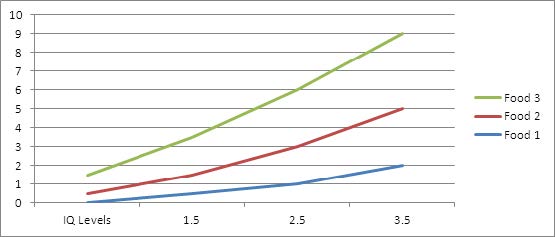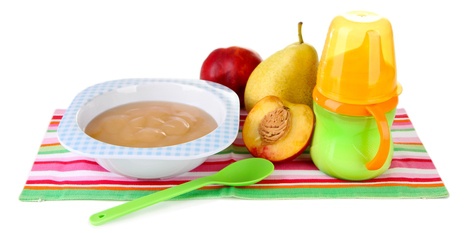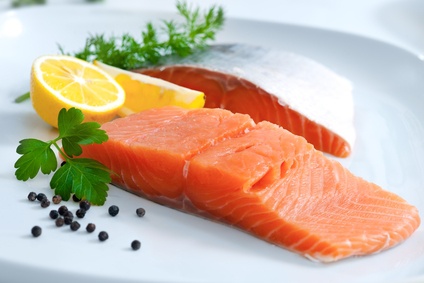“The first school for your baby is not preschool but as early as before born
and it is called womb school. This fresh and current concept creates an
unprecedented opportunity for moms to explore the possibility to reform a
baby with different brain functions and updated IQ. A dream that has been
dreamed by human being for millions of years is coming to us.”
Chapter 11 - NUTRITIONAL FOODS FOR BABIES
11.1 Effect of Breast Feeding on Intelligence in Children
There are various approaches that have been deduced to help define the course of baby’s intelligence and how it can be improved as the child grows up. Since 1929, several studies have been conducted to determine the connection between breast fed children and those denied this valuable and natural resource.
In 1979, data collected from the US national longitudinal survey of youth aimed to ascertain the impact that breast feeding has on intelligence where 5475 children and 3161 mothers were examined. The cognitive results from the study confirmed that children who were breast fed had a higher IQ and were more likely to avoid smoking or even become victims of poverty in the future. Intelligence has been designated as one of the most difficult aspects in human beings to define. Scientists have for many years tried to evaluate this phenomenon with very few positive results.
Breastfed children have a tendency of scoring higher during a normal intelligence test routine. Other factors that established a child’s intelligence during the research study also included the age of the mother during the child’s birth. With regards to nutrients and breast milk, the long-chain lipids and unsaturated omega 3 fatty acids, usually absent in other formulas and present in breast milk have been attributed to betterment of the nervous system.
The minimum duration in breastfeeding is said to be three months while the maximum duration is said to be fourteen months. The study also established that children breastfed for long scored higher in IQ test when compared to those breastfed for less. The following bar graph shows how duration in breastfeeding can affect a child’s IQ as he or she grows.

The green mark represents groups of children breastfed for about 14 months.
The red mark represents children breast fed for about six months.
The blue mark represents children breastfed for up to 3 months only.
It is evident in the graph that those children who were breastfed for three months and below scored poorer in an overall IQ test than those children who were breastfed for six months. In addition, those breastfed for up to 14 months scored exemplary in the IQ test.
A large scale study of more than 8,000 mother-infant pairs reveals that prolonged breast feeding improved scores of intelligent tests in childhood as reported by the New York Times in 2008. In this study, breast feeding was compared with standard care, and resulted in significantly higher on tests of vocabulary, word matching and verbal IQ when the children were 6 ½ years old. In addition, teacher ratings of those children who received breast feeding were also consistently higher.
These data indicate that breast feeding really has impact on intelligence development, it is not only that the nutrients from your milk will enhance the brain development better then cow milk and any other milk, but is also considered that during breast feeding, the interactions between the mother and the baby may improve the learning experiences of the baby, and thus have impact on intelligent IQ.
“A non-breastfed child is 14 times more likely to die in the first six months than an exclusively breastfed child”, according to The Lancet.

Breastfed children scored score higher on cognitive and IQ tests at school age, and also on tests of visual acuity. Source: Tenstep.org
| FACTS about Breast-Feeding:
● Research has found that breastfed babies perform better on different kinds of intelligence tests as they grow older. ● Children who had consumed mother's milk by tube in early weeks of life had a significantly higher IQ at 7.5 to 8 yr. than those who received no maternal milk, even after adjustment for differences between groups and mothers' educational and social class. ● Mother's milk contains the fatty acids essential to the development of the baby's nervous system and vision. This may be one of the reasons why breastfed babies' IQ are 8 to 10 points higher than that of formula-fed babies. ● Breastfed children scored score higher on cognitive and IQ tests at school age, and also on tests of visual acuity. ● Cholesterol and other types of fat in breast milk support the growth of nerve tissue. ● Supplementary regression analysis examining the strength of relationship between duration of breastfeeding and cognitive development show a small but significant relationship between duration of breastfeeding and scores on the mental development index of the Bayley Scales at 1 and 2 years. ● In 771 low-birth-weight infants, babies whose mothers chose to provide breast milk had an 8-point advantage in mean Bayley's mental developmental index over infants of mothers choosing not to do so. |
11.2 Why good nutrition is crucial for children’s early years
Junk food is sweet but not good, especially for babies and toddlers during their early years in life according to a recent study by Bristol University. The study was not only aimed to educate and inform parents on the negative effects associated with processed foods, but also the benefits of a good nutrition to their children.
Some of the factors highlighted during the research also necessitated parents and caregivers to understand the value of breastfeeding although other cases such as maternal education and age were also addressed.
Enough vitamins in all meals with regards to this study are very crucial for brain development. In this research study, parents were required to complete several questionnaires. The questionnaires contained general questions on the foods and drinks taken by their children from the ages of three all the way to their eighth birthday.
The findings showed that there were three types of food. The first category of food was made up of processed meals while the second category was made up of traditional meals, and the third category was made up of a nutritious healthy diet.
The following chart shows how each food category responds to the improvement of IQ levels as the child grows from 0-8 years.

The first category of food, which was mainly junk set to identify the negative effects of processed foods. The point is that processed foods are high in sugars and fats when compared to the second category of meals, which was mainly based on the traditional mode of eating where the diet was particularly made up of proteins, such as meat, and vegetables.
The notable diet, food category three was perhaps the best to be introduced to children as the study unveils that this not only improves IQ substantially, but is also healthy because the nutrients contained include vegetables and fruits respectively.
The study further unveils that children whose fats and sugars dominated their diets were more vulnerable to degraded brain levels. The candidates in the research were ranked upon attaining the age of 8 years. According to Dr. Pauline Emmett who was symbolic in the study, she pointed out that “the brain grows at its fastest rate during the first three years of a human’s life.
Dr. Emmet also added that a good nutrition promotes steadfast growth. This is the reason that after the child attains the age of three, brain growth slows down, and thus thereafter, the diet rarely presents any positive results. Although the findings showed otherwise, she also noted that despite bad results with the diet after the age of three, parents should continue serving their children a balanced diet, especially those filled with fruits and vegetables.
A child is normally supposed to share the dining table with the rest of the family, which means that the food eaten by adults should be the same given to him or her. The problem is that people have grown ultimately lazy, and they prefer processed foods, which are easier to prepare when compared to the high table meals.
Overall, there is every reason for concerned moms and dads to take measures and give rise to a healthy smart child. A fat free diet is clearly everything that should promote this goal. This research study has helped parents and caregivers realize that a child and an adult are one and the same thing.
During every meal, a piece of fruit should be availed and the same goes for vegetables. In fact, fruits and vegetables such as apples, oranges, corn, broccoli and tomatoes are highly recommended in order to give rise to healthy strong children and contribute positively to a working intelligent generation.

11.3 Nutritional and Recommended Foods for Babies and Children
While the foods taken by mothers and fathers before baby’s conception and during pregnancy may impact child’s IQ positively or negatively. There are foods that babies and children should be fed with from the time of birth. Understanding these categories of foods presents general importance in the sense that the nutritive value in each would promote good health and brain function respectively.
Scientists have confirmed that the brain grows faster during the first three years of a child’s life. During this time, special foods with varying nutrients to the brain should be introduced to your baby. A study conducted between 1991 and 1992 on parents and the foods they fed their children from the age of three to eight years showed that processed foods led to low IQ if administered to the child at the age of three irrespective of whether the diet improved with time or not.
The research also identified that healthy diet led to higher IQ especially if introduced between the ages of three and four years. Further, improving patterns on the diet between the ages of four years to eight years had no effect on IQ. For this reason, a good nutrition during the first three years of a child could have a positive impact on the level of IQ according to the 1991 and 1992 research study.

11.4 Fruits and vegetables recommended for children
Children are usually faced by so many challenges from the time of birth. For one, due to their weak immunity system from the very tender age, they are vulnerable to germs that could lead to dangerous diseases and other sicknesses. Unfortunately, it is not possible to withdraw them from the atmosphere that causes these challenges, which is the reason that parents and caregivers are advised to watch the type of food they feed them.
In addition to this, they are also supposed to stay informed as far as healthy feeding is concerned. Fruits and vegetables are highly recommended to children as they grow up because they usually strengthen the white blood cells in the body, which in return help fight health problems caused by germs and environmental conditions. But is fighting sickness the only benefit linked to children fed with fruits and vegetables in addition to normal food and nutrient category? Well, the point is that various research studies have shown that feeding children with multiple diets all packed with plethora of fruits and vegetables lead to more IQ developed generations.
While understanding this fact could help some parents and caregivers head to the grocery shops and subsequently fill their refrigerators with all kinds of fruits and vegetables, it is primarily important to take note of what category of fruits and vegetables kids should take and why. All fruits and vegetables can be categorized according to their origins, and vitamins contained such as those packed with vitamins A, B, C, D, E and K. but in order to understand which fruits and vegetables to buy, evaluating some of the common individually can help create a better understanding when buying.
Apples - Apples are known for their amazing fibers, pectin, particularly beneficial for youngsters as they grow. These fibers ultimately bind with cholesterol contained in other foods, and thus restricting movement of those fats to arteries. According to researchers, children fed with apples are able to overcome various health effects such as diabetes, asthma and some types of cancer.
Oranges - Orange fruit is widely associated with vitamin C. This means that iron, which is useful towards protecting against anemia, is available. The peels are also packed with vitamin A and are linked with boosting the immunity system. The antioxidants and iron essentials in orange fruit promote an easier way to fight infectious diseases such as flu and common colds.
Tomato - Most people associate tomatoes with vegetables, but as much as it can list as a vegetable; it is also a great fruit. Lycopene is naturally available in tomatoes. This nutrient, unlike other types, cannot be produced by the body and is highly known for its cancer and heart disease protecting mechanism.
Sweet Potatoes - Though a root and unearthed from the ground like potatoes, sweet potatoes are compounded with rich vegetable nutrients and thus highly recommended for children as they grow up. In fact, experts insist that substituting sweet potatoes with other forms of vitamins allows children to access vitamins A and C, as well as iron and calcium respectively. Eating sweet potatoes leads to strong teeth and bones, good sight, tough skin and a healthy heart.
Broccoli - Broccoli is widely associated with children and those people who understand the value of vitamin C, iron, and most importantly, a strong immunity system. This amazing vegetable can also be substituted with pumpkins, but not forgetting salad of course.
The listed fruits and vegetables scientifically indicate that they are very useful. But what about a recent report, which suggests otherwise? Apples have been categorized as the dirtiest fruits according to the research study where 98 percent were contaminated with pesticides. The cleanest fruits and vegetables from the study included onions, avocados and asparagus among others.
Strawberries, on the other hand were a close match up with apples as they ranked at position three. In any case, fruits and vegetables, regardless of where they all rank; their benefits are way beyond the indicated contaminants.
11.5 Fish and other Seafood
Fish and other seafood are compounded with amazing nutrients. These nutrients provide great positive health effects to mothers during and after pregnancy as well as babies as they are introduced to solid foods. Fish and other sea foods such as salmon contain omega 3 fats attributed to the growth of human brain which leads to improved thinking capacity.
Children who have been exposed to these foods usually perform better during IQ tests when compared to those children who were not. Although there are a few risks associated with too much fish and sea food intakes, researchers have been able to note that there are more benefits in the same food when compared to the shortlisted risk factors.

Omega-3
As mentioned in Chapter 8, omega-3 fats have been attributed to intelligence by scientists and experts. Studies have confirmed that women who took a lot of omega- 3 fats during pregnancy had a higher chance of giving birth to children with improved language skills, which also culminates to higher IQ. Incidentally, children fed in diets rich in omega 3 also have advanced cognitive development.
Some of the foods linked to omega 3 and subsequently to be fed to pregnant mothers or infants include eggs, fish, salmon, as well as linseed respectively. Babies who are transitioning from mother’s milk, which is also another source of these nutrients, should be introduced to foods rich in omega 3 fats respectively.
Omega 3 fats should be taken by pregnant and lactating mothers as well as children between 1-3 years.

11.7 Importance of Copper and other Minerals
Copper nutrients are very useful towards the growth of newborn babies and should be introduced to mothers during pregnancy. As mother’s milk doesn’t contain enough copper, it is primary that parents consider providing this important nutrient through other means.
Once the baby is born, it should be introduced to copper within its first few months. This is because it has become evident that newborns lacking copper are at higher risk of infections during infancy. In addition, more studies have shown that copper is also a necessity when it comes to proper immunity function.
11.8 Vitamins
There are many types of vitamins that growing children should be introduced to. But reportedly, there are three special vitamins that many growing children rarely access. Vitamins A, C and D. Children aged between 6 months to 5 years are usually given supplements in order to account for these vitamins.

There are various foods which can supplement for these nutrients as there is accumulated fear that issuing vitamin drops to children could lead to more than one vitamin supplementation, which is not recommended. For instance, some parents give cod liver oil in order to provide vitamins A and D to their children but instead of leaving it at that point, they also end up providing extra vitamin A due to the fact that there are much more vitamin A than D than the body needs in cod liver oil.
Vitamin D is available naturally in foods such as eggs and oily fish. Most importantly, when exposed to sun suitably, our body can produce vitamin D that is the best and safest way of getting enough vitamin D. Vitamin A on the other hand can be accessed from dairy products, some fruits such as mangoes and carrots, and vegetables such as spinach, cabbage and broccoli.
Vitamin C is good because it boosts the immune system in children while also contributing towards iron absorption to the body. Vitamin C is naturally accessible in most fruits and vegetables such as oranges, kiwi, broccoli and tomatoes among others.
11.9 Beware of apples and other fruits!
Many fruits available in the food stores in USA and Canada can be considered contaminated food because they may be exposed to harmful chemicals during their growing stage. The chemicals used are pesticides, herbicides, fungicides, fertilizers and growth stimulating chemicals.
These chemicals are used to ward off pests and weeds and to increase the growth of fruits and vegetables. These fruits must be carefully washed and peeled before consume them in order to eliminate these potential harmful chemicals. These chemical substances can be damaging to the children’s brains and bodies.
According to researchers at Purdue University in Indiana, apples now top the list as the most contaminated by pesticides, even after they are peeled and washed.
Reference: The Environmental Working Group (EWG), "Shoppers Guide to Pesticides", annual report. 2016
Researchers recommend that consumers get around the problem by choosing organic. To receive the most nutrients out of our fruits and vegetables, we should select the foods from the least contaminated food list.

11.10 Kids who eat fast foods have lower IQs
A recent study by the University of London showcased that children fed with fast foods tend to register lower during a normal IQ test. Parents who care about the general health of their children have been on the frontline to advocate for healthy balanced diets with all food portions properly rationed to ensure those unnecessary for the body during particular ages.
For instance, a young baby doesn’t really need a whole lot of energy giving foods when compared to foods such as vitamins, minerals and proteins. For this reason, the caregiver should observe absolute responsibility when feeding each portion. During the experiment, which set to define the demerits associated with fast foods with regards to strong intelligence, 4,000 Scottish children were tested and the results mirrored to junk and other processed foods.
Lower intelligence was recorded on children who were fed on higher calorie rich foods. According to Dr. Sophie von Stumm, the head at the department of psychology at the University of London, she says that food eaten automatically affects brain development positively or negatively, and thus, according to the compiled research, it was realized that specific foods had a higher negative or positive impact when compared to others.
Generally, food eaten can either promote good or bad health and thus the right proportions and nutrients contained should be focused. Children fed with processed foods, according to another research by the University of Adelaide in Australia, shows that their intelligence levels are usually lower as they grow up when compared to those children fed with healthy diet rich with vitamins
In order to promote improved IQ, it is important that caregivers have an understanding about processed foods, how to keep their children away from them, and most importantly, how to ensure none is available in the home freezer. Canned food and other packed meals should be limitedly available at home.
Children above 4 years already know the purpose of the freezer in the house, and if they can open it and subsequently find sweet junk, they will obviously consume it. This means that it is the role of the parent to take the necessary measures towards restricting access to processed foods.
At the University of Bristol, Kate Northstone, the head of a research study aimed to uncover the same results mentioned that toddlers left to snack on processed foods are most likely to lag behind in terms of a better IQ in the future.
Incidentally, children who were fed on fruit and vegetable diets scored a lot better in IQ tests than those, whose caregivers omitted those foods.

Experts have been on the frontline to educate parents and caregivers on ways in which they can restrict unhealthy foods to their children, and subsequently introduce foods that would present good results, but unless the target parties take time to understand the goal behind these recommendations, future intelligence is in jeopardy.
In his statement to the Guardian, Michael Nelson, director of research at School Food Trust in the UK, said that it has already become evident that 23% of children already start schooling either overweight or obese. A good diet helps promote a healthy lifestyle that will be realized with good performance in schools according to Nelson.
Healthy diet isn’t the only alternative that researchers have come to identify towards intelligent building. There have been many research studies primarily conducted to ascertain ways to improve IQ in children, such as the negative effects of cigarette smoking and lead exposure on parents before conception. Another significant cause towards children with lower IQ has been linked to giving birth at old age.

11.11 Other Considerations
Although most nutritional foods from infancy as they grow up have already been covered in this chapter, there are other fascinating considerations that could help improve babies and children’s health as they grow. Notably, a healthy diet facilitates all nutrients required by babies during their development phases.
For example, the baby’s first solid foods should be carefully chosen. Parents are usually unable to make informed decisions on when solid foods should be introduced, how much should be offered to the baby, and what comes before the other. All these contradicting questions can turn disastrous if wrong judgment calls are made. While there are some mothers who start earlier with solid food introduction, mostly between the first four and six months, babies should be introduced to solid foods slowly

When considering nutritional foods for babies, parents must take absolute precautions and get necessary assistance as they endeavor to provide the best for their unborn children or likewise as the baby grows to an adult. All scientific and natural methods should be evaluated in a step by step manner such that the parent understands the benefits of various nutrients, and how they apply in everyday lives of children in terms of intelligence boosting and overall health.
Summary ● Scientists have confirmed that the brain grows faster during the first three years of a child’s life. Therefore during this time, special foods with varying nutrients to the brain should be introduced to the baby. ● Mother's milk contains the fatty acids essential to the development of the baby's nervous system and vision. This may be one of the reasons why breastfed babies' IQ are 8 to 10 points higher than that of formula-fed babies. ● Recent studies have provided evidence that breastfeeding promotion to mothers can results in infants with higher IQ than infants whose mothers receive no encouragement to breastfeed ● One study reported that performance in childhood intelligence tests was better in children who had been breastfed compared to those who had been bottle fed. It is difficult to assess emotional factors, and no firm conclusions can be drawn. However, it is thought that breastfeeding enhances the 'bonding' process between baby and mother. ● Fish and other sea foods such as salmon contain omega 3 fats attributed to the growth of human brain which leads to improved thinking capacity. ● Many fruits available in the food stores in USA and Canada can be considered contaminated food because they may be exposed to harmful chemicals during their growing stage. We should consume organic fruits or select the foods from the least contaminated food list. ● Fruits must be carefully washed and peeled before consume them in order to eliminate these potential harmful chemicals. ● Children fed with processed foods, according to another research by the University of Adelaide in Australia, shows that their intelligence levels are usually lower as they grow up when compared to those children fed with healthy diet rich with vitamins. |
